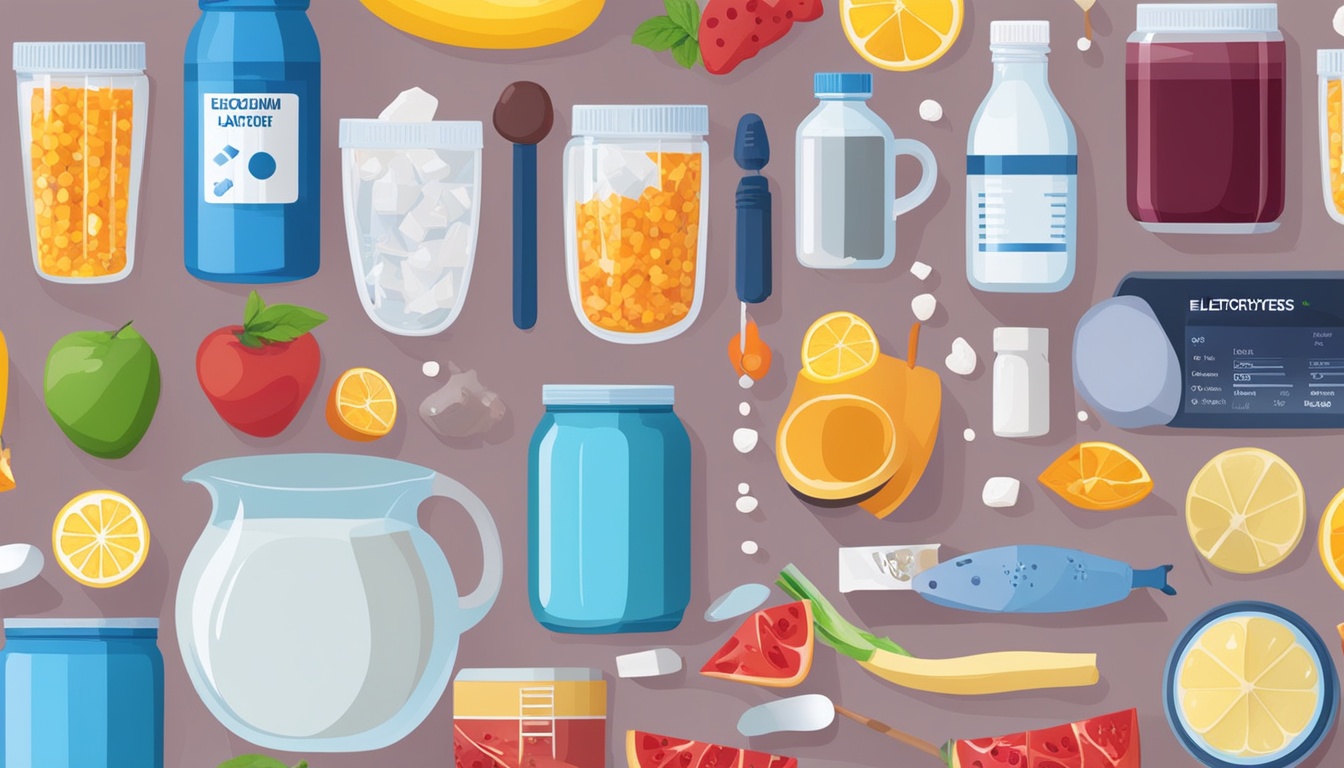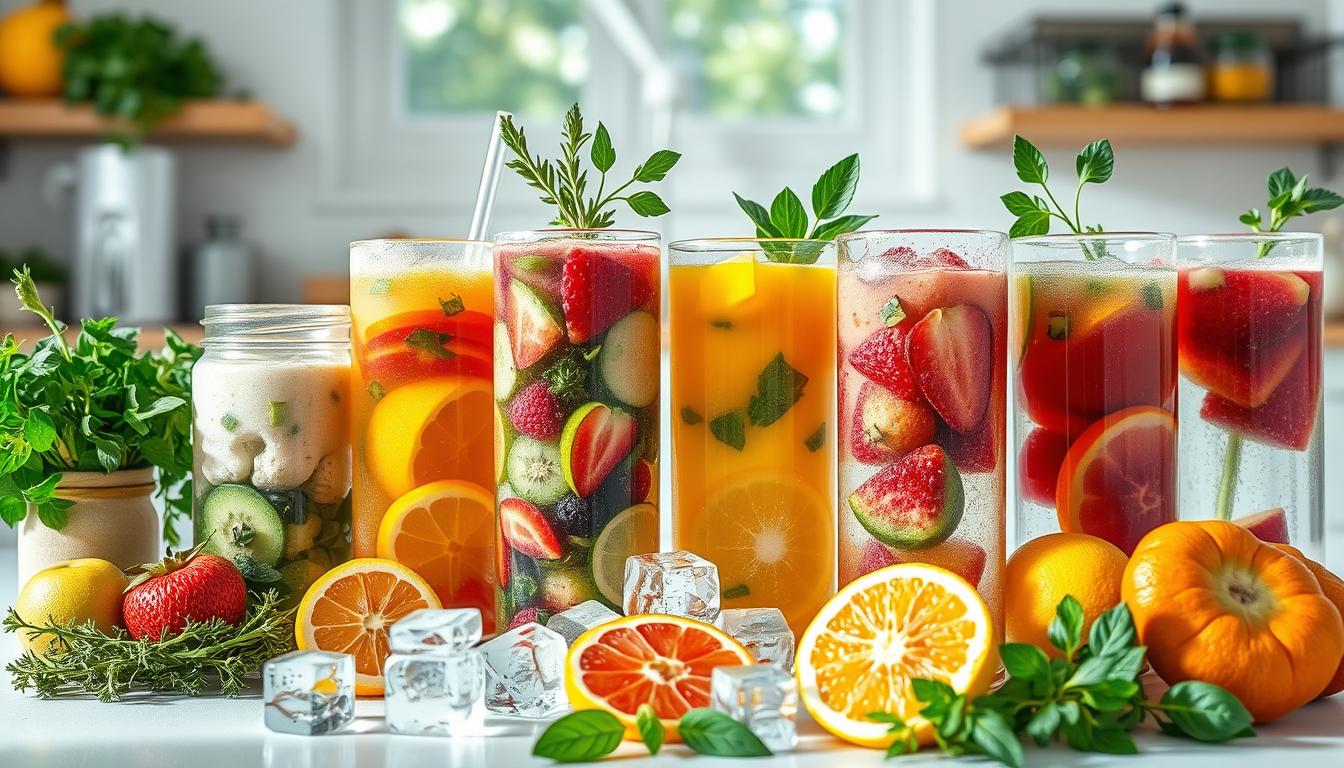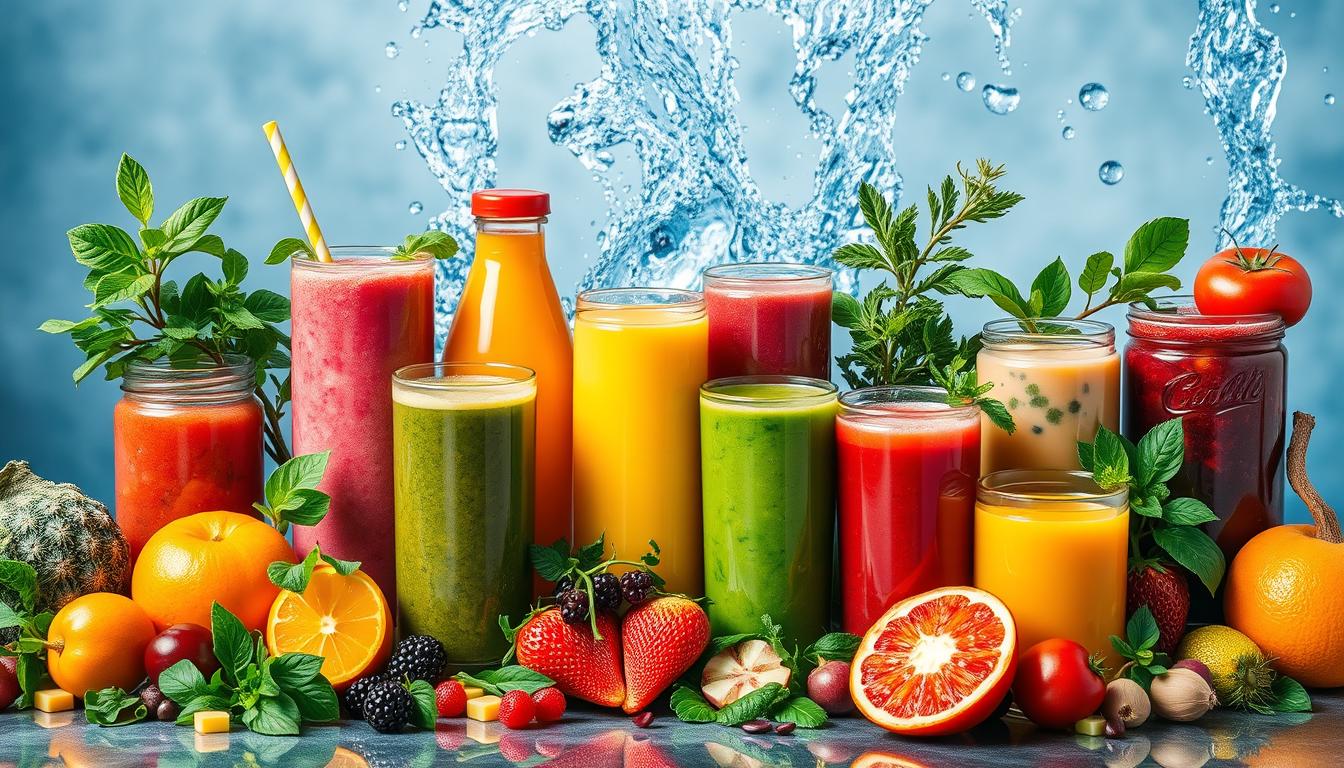Staying hydrated is key for good health, especially when you’re active or in the heat. Our bodies are about 60% water, showing how vital it is to keep drinking fluids. When you’re into sports or hard exercise, it’s important to watch how much fluid you drink and make sure you’re getting enough electrolytes to avoid dehydration and perform well.
Electrolytes like sodium, potassium, and others are crucial for many body functions. They help with nerve and muscle work, keeping your heart beat right, moving nutrients around, and controlling blood pressure. When you sweat or go to the bathroom a lot, you lose these electrolytes. So, it’s important to get them back to stay healthy.
Good hydration and electrolyte balance are important for staying healthy. Water is the main part of staying hydrated, but athletes or busy people might want to add electrolyte drinks or supplements. Just remember, some sports drinks have a lot of sugar, so try to pick ones with less sugar when you can.
Key Takeaways
- The human body is about 60% water, showing how important it is to drink enough.
- Electrolytes like sodium and potassium are key for many body functions, including nerve and muscle work, heart rhythm, and blood pressure.
- When you’re active, you lose electrolytes through sweat and urine, so getting them back is important to avoid problems.
- Good hydration means watching how much fluid you drink and using electrolyte drinks or supplements when needed.
- Watch out for the sugar in sports drinks and choose ones with less sugar for better hydration and electrolyte balance.
The Importance of Hydration for Athletes
For athletes, staying hydrated is key to top performance and avoiding dehydration’s bad effects. Sweat makes the body lose fluids, which can cause problems if not replaced. Athletes can lose up to 2 quarts of fluid per hour of activity. Activities like running long distances or hiking hard can drain up to 3 quarts per hour.
Why Staying Hydrated is Crucial for Athletic Performance
Not drinking enough water can hurt how well athletes perform. It can lead to cramps, headaches, and even heat stroke. Dehydration makes joints less cushioned, reducing speed and flexibility. It also affects how muscles work, including the heart muscles, and can cause cramps. Keeping a water diet and balancing electrolytes is crucial to avoid these issues.
Electrolytes like sodium, potassium, and magnesium are key for hydration and doing well in sports. They help with nerve signals to muscles and are crucial for muscle function. There are different sports drinks for different needs. Isotonic drinks help restore electrolytes, hypotonic drinks are for rehydrating after working out, and hypertonic drinks are for long sports events. Salt loss through sweat varies a lot, so it’s important to replace these lost electrolytes.
| Type of Sports Drink | Purpose | Recommended Intake |
|---|---|---|
| Isotonic | Restore electrolyte balance | 6-12 ounces every 20 minutes during activity |
| Hypotonic | Rehydration post-workout | 16-24 ounces per pound lost after activity |
| Hypertonic | Endurance sports | Consume as needed during prolonged activity |
The Impact of Dehydration on Endurance, Breathing, and Mood
Dehydration can really affect endurance, breathing, and how you feel. When you breathe in, your body needs fluids to make the air easier to breathe. If you’re not drinking enough water, this can make breathing harder and lower your endurance. Also, your brain needs water to work right. Not drinking enough can make you feel moody, less focused, give you headaches, and make you irritable.
“Dehydration of ≥ 2% body mass impaired endurance exercise performance, causing muscle strength to fall by 5.5 ± 1.0% and anaerobic power to fall by -5.8 ± 2.3%.”
To stay away from these problems, it’s key to drink enough water before, during, and after exercise. The National Athletic Trainers’ Association (NATA) suggests drinking 500 to 600 ml of water or sports drink 2 to 3 hours before exercise. Then, drink an extra 200 to 300 ml 10 to 20 minutes before starting. During long activities, use a sports drink to replace lost electrolytes and keep your kidneys healthy. After working out, aim for 16-24 ounces of water or a hypotonic sports drink to help with weight loss and overall health.
Understanding Electrolytes and Their Role in Hydration
Athletes need to stay hydrated to perform well, and electrolytes are key. These minerals have an electric charge when in water. They help with fluid balance, muscle work, and nerve signals.
What are Electrolytes and Why Do Athletes Need Them?
The main electrolytes are sodium, potassium, calcium, magnesium, chloride, phosphate, and bicarbonate. They keep bones strong, muscles and nerves working right, and control fluid levels. Athletes need them to:
- Maintain water balance
- Balance the body’s pH
- Transport nutrients
- Support muscle and nerve function
- Regulate heart rate
- Stabilize blood pressure
When athletes sweat a lot, they lose electrolytes. This can lead to imbalances if not fixed.
How Electrolyte Imbalance Affects the Body
Electrolyte imbalances can happen for many reasons, like sweating too much, some medicines, health issues, or not drinking enough water. If electrolytes get too high or low, it can cause symptoms and hurt how well athletes perform.
| Electrolyte | Imbalance | Symptoms |
|---|---|---|
| Sodium | Hypernatremia or Hyponatremia | Thirst, confusion, seizures, coma |
| Potassium | Hyperkalemia or Hypokalemia | Muscle weakness, irregular heart rhythms, fatigue |
| Calcium | Hypercalcemia or Hypocalcemia | Muscle cramps, confusion, irregular heartbeat |
| Magnesium | Hypermagnesemia or Hypomagnesemia | Muscle weakness, nausea, irregular heartbeat |
| Chloride | Hyperchloremia or Hypochloremia | Dehydration, muscle weakness, confusion |
| Phosphate | Hyperphosphatemia or Hypophosphatemia | Muscle weakness, bone pain, confusion |
| Bicarbonate | Acidosis or Alkalosis | Fatigue, nausea, confusion, muscle twitching |
Doctors use tests like an electrolyte panel to check electrolyte levels. Sometimes, an anion gap blood test is used to look at acid-base balance. Fixing electrolyte imbalances quickly is important to avoid serious problems and keep the body working right.
Recognizing the Signs and Symptoms of Dehydration
Drinking enough water is key to staying healthy. But, many don’t know they’re dehydrated until it’s serious. Knowing the early signs can help you drink enough water and avoid problems.
Thirst as a Late Indicator of Dehydration
Many think thirst means you’re getting dehydrated. But, by the time you feel thirsty, you’ve lost a lot of fluids already. Drinking water regularly is important, even if you’re not thirsty.
Urine Color as a Clue to Hydration Status
Looking at your urine color can tell you if you’re hydrated. If it’s pale yellow or clear, you’re drinking enough water. Dark yellow or amber urine means you need more fluids.
| Urine Color | Hydration Status |
|---|---|
| Pale yellow or clear | Well-hydrated |
| Dark yellow | Mildly dehydrated |
| Amber or honey-colored | Moderately dehydrated |
| Brown or dark brown | Severely dehydrated |
Other Physical Symptoms of Dehydration
Other signs of dehydration include:
- Dry mouth and lips
- Fatigue or weakness
- Headache
- Dizziness or lightheadedness
- Decreased skin elasticity
- Rapid heartbeat
- Muscle cramps
If you notice these symptoms, drink more water. See a doctor if they get worse. Drinking enough water is crucial to avoid dehydration and its problems.
Choosing the Right Drinks for Optimal Hydration
Athletes have many drink options to stay hydrated. Water is basic but might not always be the best choice. Drinking too much water can lower electrolytes in the body, causing imbalances. Finding the right mix of fluids and electrolytes is key for good performance and health.
Water: The Basics of Hydration
Water is key for staying hydrated. It’s important to drink enough all day to keep fluids balanced. A guide on overcoming water drinking challenges says most people get enough electrolytes from diet and hydration. Sparkling water is just as good as plain water for staying hydrated.
Sports Drinks: Benefits and Types
Sports drinks help athletes stay hydrated and replenished during workouts or games. They have water, flavors, colors, electrolytes, and sugar for energy. Sports drinks replace lost fluids and electrolytes and give energy. They come in isotonic, hypotonic, or hypertonic types, based on their mix of carbs and electrolytes.
| Type of Sports Drink | Carbohydrate Content | Electrolyte Content | Best For |
|---|---|---|---|
| Isotonic | 6-8% | Similar to body fluids | Rehydration during intense exercise lasting more than 1 hour |
| Hypotonic | Less than 6% | Lower than body fluids | Rapid hydration without energy needs |
| Hypertonic | More than 8% | Higher than body fluids | Replenishing energy stores post-exercise |
A 12-ounce (355ml) serving of Gatorade or Powerade has over 20 grams of sugar. Athletes should pick sports drinks based on their needs and how much sugar they can handle.
Other Hydrating Beverages for Athletes
Athletes can also choose other drinks for hydration and electrolytes. Coconut water is a natural source of electrolytes with less sugar. Watermelon juice is also hydrating, offering potassium and magnesium.
For a low-calorie option, athletes can add electrolyte tablets to water. Homemade drinks, like water, fruit juice, and a bit of salt, can also be a good choice.
“Eating water-rich fruits and veggies helps contribute to daily fluid intake and hydration, so don’t overlook the power of a well-balanced diet in supporting your hydration goals.” – Sports Nutritionist
The best hydration plan for athletes combines water, sports drinks, and other drinks based on their needs. Understanding sports drinks helps athletes make good choices for their performance and health.
Water Diet and Electrolyte Balance: How to Maintain Proper Hydration
Staying hydrated is key for good health, especially for athletes and those who are active. How much water you need varies with the climate, your clothes, how hard you exercise, and how long you do it. If you sweat a lot, you’ll need more water. Some health conditions like diabetes or heart disease might mean you need to drink more water too.
Using “motivational” water bottles with marked levels can help you remember to drink enough water. Parents, coaches, and trainers can encourage athletes to drink more water and electrolytes. But, drinking a lot of electrolytes is usually safe for healthy people. Still, if you have high blood pressure or kidney issues, talk to a doctor before increasing your salt intake.
Some sports drinks have a lot of sugar, which can add calories and increase the risk of obesity, especially in kids and inactive people. Water is the best drink for most people, and fruits and veggies can also help with hydration. Drinking water before exercise or being in the sun can prevent dehydration.
The National Academy of Sciences suggests men drink 3.7 liters and women 2.7 liters of fluids daily. A study with over 18,300 American adults found that drinking 1 percent more water daily led to fewer calories and less fat, sugar, sodium, and cholesterol. Staying hydrated is important for your body, as it makes up a lot of your blood and brain.
Dehydration can hurt your memory, attention, and energy, and throw off the balance of electrolyte minerals like sodium and potassium, which are key for muscles and the heart.
To check if you’re hydrated, the U.S. Army Public Health Command suggests looking at your urine:
- Pale yellow to light yellow means you’re good
- Darker yellow means you’re not drinking enough
- Brown or cola-colored urine is a sign of a serious problem
Using good hydration strategies and keeping an eye on how much fluid you drink can prevent dehydration and keep your electrolytes in balance. Drinking enough water might even help you age slower because of its heart health benefits. Making hydration a daily habit can support your overall health and well-being.
Implementing a Personalized Sports Hydration Plan
Creating a hydration plan tailored to each athlete is key to staying on top of their game. A personalized hydration plan should look at body size, sweat rate, and the intensity and length of your workouts. It should also consider the weather. This way, athletes can keep their electrolytes in check and stay healthy.
Pre-Activity Hydration Strategies
It’s vital to start with a hydrated body before any exercise. Experts suggest drinking 16 to 24 ounces of fluid 2 hours before you work out. Then, add another 8 to 16 ounces 15 minutes before you begin. This prepares your body for the physical demands ahead and helps prevent dehydration.
Staying Hydrated During Exercise
Keeping hydrated during exercise is key to staying strong and avoiding heat-related illnesses. How much fluid you need depends on how hard and long you exercise, as well as how much you sweat. Generally, aim for 16 to 32 ounces of water or sports drink every 30 to 60 minutes.
If you’re doing intense or long workouts, you might need more. In hot or humid weather, you’ll need even more fluid. Using sports drinks with sodium and potassium is a good idea for workouts over 45 minutes for adults or an hour for kids. These drinks help replace lost electrolytes and keep your body balanced.
For every 20 minutes of sports play, adults should aim to drink 6 to 12 ounces of fluid, while teens (age 13 to 18) should consume 11 to 16 ounces, and kids (age 9 to 12) should drink 3 to 8 ounces.
Post-Workout Rehydration and Recovery
After working out, it’s important to replenish what you lost. Drink 16 to 24 ounces of water or a sports drink, depending on how much you sweated. For every pound you lost, aim to drink 24 ounces of fluid back. This helps your body get back in balance and supports recovery.
Also, eating carbs and protein within 30 to 60 minutes after exercise helps with muscle repair and glycogen replenishment. Chocolate milk or a protein shake can be great choices for recovery.
| Timing | Hydration Strategy |
|---|---|
| Pre-Activity | 16-24 oz fluid 2 hours before, 8-16 oz 15 minutes before |
| During Activity | 16-32 oz water or sports drink per 30-60 minutes |
| Post-Activity | 16-24 oz water or hypotonic sports drink per pound lost |
By tailoring your hydration plan for pre, during, and after exercise, you can boost your performance and keep your electrolytes balanced. Always pay attention to your body and adjust your hydration as needed. This will help you stay on top of your game and avoid dehydration.
Conclusion
Keeping your body hydrated and balanced with electrolytes is key for good health and doing well in sports. It’s important to know why staying hydrated is crucial and how to spot dehydration signs. Choosing the right drinks can help your body work better during exercise.
A plan that covers pre-, during, and after workouts can make sure you get enough fluids and electrolytes. This helps your body function well.
Usually, eating a balanced diet with fruits, veggies, dairy, nuts, and seeds gives you enough electrolytes. But, athletes or those working out in very hot weather might need more electrolytes from sports drinks. If you feel tired, weak, or confused, talk to a doctor about it.
By drinking enough water and eating well, you support your body’s important functions. This leads to better health and sports performance. Remember, staying hydrated is the secret to reaching your full potential!






